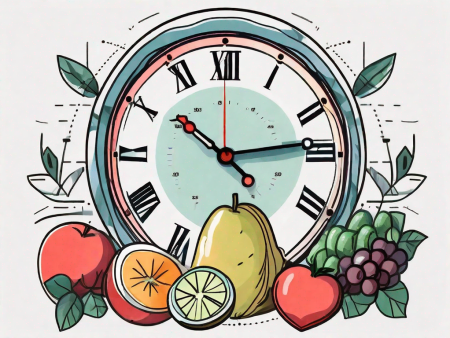Discover the potential benefits of intermittent fasting for individuals dealing with chronic pain.
Exploring the Benefits of Intermittent Fasting for Chronic Pain Sufferers
Are you tired of living with chronic pain? Do you find yourself constantly searching for new ways to manage your symptoms? Well, it’s time to consider the power of intermittent fasting! In this article, we will delve deep into the world of intermittent fasting and discover how it can benefit chronic pain sufferers like yourself. So, get ready to say goodbye to your pain and hello to a new, healthier you!
Understanding Chronic Pain: A Brief Overview

Before we dive into the wonders of intermittent fasting, let’s take a moment to understand the beast we’re trying to conquer – chronic pain. This persistent pain can have a significant impact on your quality of life, making even simple daily tasks seem insurmountable. Whether it’s due to arthritis, fibromyalgia, or any other condition, chronic pain is a tough nut to crack.
Chronic pain is not just a physical sensation; it affects every aspect of your being. It can take a toll on your mental and emotional well-being, leading to feelings of frustration, sadness, and even depression. The constant discomfort can make it challenging to focus on anything else, leaving you feeling drained and exhausted.
But don’t lose hope just yet! Understanding the intricacies of chronic pain can help you develop effective strategies to manage and alleviate it. By exploring different treatment options and making lifestyle changes, you can regain control over your life and find relief from the grips of chronic pain.
The Impact of Chronic Pain on Quality of Life
We all know that chronic pain can be a real buzzkill. It affects your mood, your ability to work, and your relationships with others. But did you know that it can also hinder your overall quality of life? Enjoying activities you once loved may feel like a distant memory. Simple pleasures like going for a walk in the park, playing with your children, or even enjoying a good night’s sleep can become elusive.
Chronic pain can limit your social interactions, as you may find it difficult to participate in social events or gatherings. The fear of exacerbating your pain or being unable to keep up with others can lead to isolation and a sense of loneliness. This can further contribute to feelings of frustration and sadness, creating a vicious cycle that is hard to break.
Well, fear not, because intermittent fasting is here to restore your zest for life! By incorporating this dietary approach into your routine, you may experience not only physical benefits but also a renewed sense of vitality and joy. Intermittent fasting has been shown to improve overall well-being, boost energy levels, and enhance mental clarity – all of which can help you reclaim the activities and experiences that chronic pain had taken away from you.
Common Treatments for Chronic Pain
Now, let’s take a quick peek at some of the common treatments for chronic pain. From medications to physical therapy, there are plenty of options out there. However, many of these treatments offer only temporary relief or come with unwanted side effects. It can be frustrating to rely on medications that may alleviate the pain momentarily but fail to address the underlying causes.
Physical therapy can be beneficial in managing chronic pain by improving flexibility, strength, and mobility. It focuses on restoring function and reducing pain through targeted exercises and techniques. However, it may require regular sessions and ongoing commitment to see significant results.
That’s where intermittent fasting steps in – providing a natural, sustainable solution that goes beyond just masking the pain. By adopting an intermittent fasting lifestyle, you can tap into the body’s innate healing mechanisms and promote cellular repair. This approach not only addresses the symptoms but also targets the root causes of chronic pain, offering long-term relief and improved overall well-being.
Intermittent fasting has been found to reduce inflammation, which is often a contributing factor to chronic pain. It also promotes autophagy, a cellular process that helps remove damaged cells and promotes the growth of new, healthy ones. Additionally, intermittent fasting can help regulate hormones and improve insulin sensitivity, which can have a positive impact on various chronic pain conditions.
So, if you’re tired of the temporary fixes and are ready to embrace a holistic approach to managing chronic pain, intermittent fasting may just be the missing piece of the puzzle. By nourishing your body with the right nutrients and giving it the rest it needs, you can embark on a journey towards a pain-free and fulfilling life.
What is Intermittent Fasting?
Intermittent fasting is not just another trendy diet; it’s a way of life. Simply put, it involves alternating periods of fasting and eating. By giving your body a break from constant digestion, you allow it to focus on repairing and healing itself. It’s like giving your body a spa day to work its magic from the inside out!
When you practice intermittent fasting, you are essentially mimicking the eating patterns of our ancestors. Back in the day, humans didn’t have access to food 24/7 like we do now. They would go through periods of feast and famine, which allowed their bodies to adapt and thrive.
During the fasting period, your body goes through a series of changes that promote overall health and well-being. One of the key benefits of intermittent fasting is its ability to regulate insulin levels. When you fast, your insulin sensitivity improves, which can help prevent and manage conditions like type 2 diabetes.
Additionally, intermittent fasting has been shown to promote autophagy, a natural process where your body cleans out damaged cells and replaces them with new ones. This cellular rejuvenation can have a profound impact on your overall health and longevity.
The Science Behind Intermittent Fasting
Now, you might be wondering, “What’s the science behind intermittent fasting?” Well, let me enlighten you, my friend. When you fast, your body switches to a state of ketosis, where it starts burning stored fat for energy instead of glucose. This metabolic shift not only helps with weight loss but also reduces inflammation – a major contributor to chronic pain.
Furthermore, intermittent fasting has been shown to increase the production of brain-derived neurotrophic factor (BDNF), a protein that promotes the growth and survival of brain cells. This can enhance cognitive function, improve mood, and protect against neurodegenerative diseases like Alzheimer’s and Parkinson’s.
Research has also found that intermittent fasting can have a positive impact on your gut health. By allowing your digestive system to rest during the fasting period, you give your gut microbiota a chance to rebalance and thrive. A healthy gut microbiome is essential for proper digestion, nutrient absorption, and a strong immune system.
Different Methods of Intermittent Fasting
Intermittent fasting isn’t a one-size-fits-all approach. There are several methods you can choose from, depending on your lifestyle and preferences. From the 16/8 method (fast for 16 hours, eat within an 8-hour window) to alternate-day fasting, the possibilities are endless. So, pick the method that suits you best and embark on your journey towards a pain-free existence!
One popular method of intermittent fasting is the 5:2 diet. With this approach, you eat normally for five days of the week and restrict your calorie intake to 500-600 calories on the remaining two days. This method allows for more flexibility and can be easier to sustain in the long run.
Another method gaining popularity is the OMAD (One Meal a Day) approach. As the name suggests, you eat only one meal within a 24-hour period and fast for the remaining hours. This method can be challenging at first, but many people find it effective for weight loss and simplifying their eating habits.
It’s important to note that intermittent fasting may not be suitable for everyone. If you have any underlying health conditions or are taking medications, it’s always best to consult with a healthcare professional before starting any new dietary regimen.
The Connection Between Diet and Chronic Pain
They say, “You are what you eat,” and when it comes to chronic pain, that saying couldn’t be truer. The food you consume can either fuel your pain or alleviate it. So, let’s take a closer look at the connection between diet and chronic pain, shall we?
How Food Can Influence Pain Levels
Did you know that certain foods can trigger inflammation in the body, leading to increased pain levels? It’s true! Processed foods, sugary treats, and those oh-so-delicious fried goodies can wreak havoc on your system, intensifying your chronic pain. But fear not, my friend, because intermittent fasting can help break this vicious cycle by encouraging healthier food choices!
The Role of Inflammation in Chronic Pain
Let’s talk about inflammation for a moment. It’s like an uninvited guest that overstays its welcome – and chronic pain thrives on it! Intermittent fasting has been shown to reduce inflammation in the body, providing much-needed relief for chronic pain sufferers. So, by embracing this fasting lifestyle, you’ll not only be soothing your taste buds but also calming those pesky inflamed tissues.
Intermittent Fasting and Chronic Pain: The Potential Benefits
Now we come to the juicy part – the potential benefits of intermittent fasting when it comes to chronic pain. Brace yourself, my friend, because you’re about to discover a whole new world of pain relief!

The Anti-Inflammatory Effects of Intermittent Fasting
Did you know that intermittent fasting can work wonders in reducing chronic inflammation? By restricting your eating window, you’re giving your body the chance to heal and repair, taming those unruly inflammatory markers that contribute to your pain. It’s like hitting the ‘mute’ button on inflammation!
Intermittent Fasting for Pain Management: What Does the Research Say?
Now, you might be thinking, “Is there any scientific evidence to back up these claims?” Well, my curious comrade, you’ll be pleased to know that research supports the potential benefits of intermittent fasting for chronic pain management. Studies have shown that fasting can lead to improvements in pain intensity, overall well-being, and even mental clarity. So, go ahead and show your pain who’s boss!
Practical Tips for Implementing Intermittent Fasting
Ready to give intermittent fasting a try? Great! But before you jump headfirst into this exciting new lifestyle, let’s go over some practical tips to ensure a smooth and successful journey.
How to Start Intermittent Fasting Safely
Starting any new endeavor can be a bit intimidating, especially when it involves fasting. But worry not, my friend, because I’m here to guide you. It’s important to ease into intermittent fasting gradually, slowly increasing the duration of your fasts over time. And don’t forget to stay hydrated and nourish your body with nutrient-rich foods during your eating window – your body deserves it!
Overcoming Common Challenges of Intermittent Fasting
Now, let’s address some common challenges you may encounter along your fasting journey. Feeling hungry? Keep yourself occupied with activities that engage your mind. Stuck in a social gathering with tempting food? Practice mindful eating and make conscious choices. Remember, intermittent fasting is a marathon, not a sprint. With determination and a pinch of willpower, you can overcome any obstacle that comes your way!
The Time is Now: Embrace the Benefits of Intermittent Fasting
There you have it, my intrepid chronic pain warrior – a comprehensive exploration of the benefits of intermittent fasting. This fasting lifestyle not only tackles chronic pain at its core but also offers a host of other health rewards. So, why wait any longer? Embrace the power of intermittent fasting and take charge of your pain-free future today!







